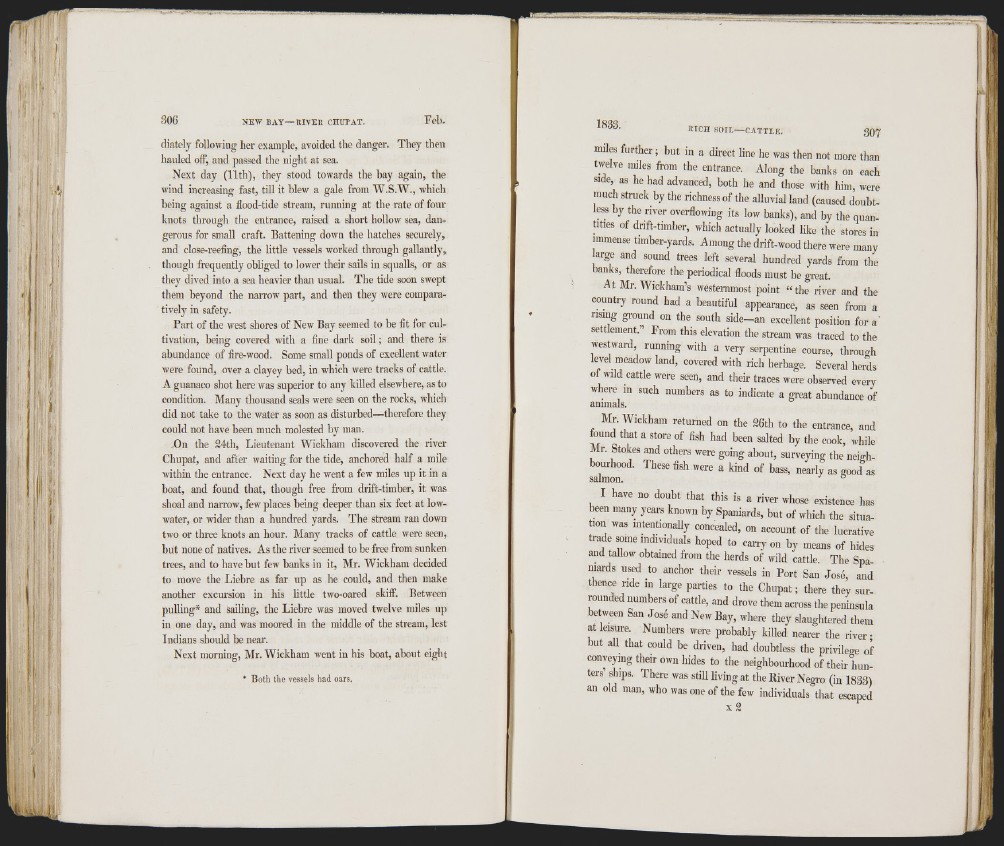
'I I
; !
306 NEW BAY—^UIVEB CHÜPAT. Feb.
diately following her example, avoided the danger. They then
hauled off, and passed the night at sea.
Next day (Ilth ), they stood towards the bay again, the
wind increasing fast, till it blew a gale from W.S.W., which
heing against a flood-tide stream, running at the rate of four
knots through the entrance, raised a short hollow sea, dangerous
for small craft. Battening down the hatches securely,
and close-reefing, the little vessels worked through gallantly,
though frequently obliged to lower their sails in squalls, or as
they dived into a sea heavier than usual. The tide soon swept
them beyond the narrow part, and then they were comparatively
in safety.
Part of the west shores of New Bay seemed to be fit for cultivation,
heing covered with a fine dark soil; and there is
abundance of fire-wood. Some small ponds of excellent water
were found, over a clayey bed, in which were tracks of cattle.
A guanaco shot here was superior to any killed elsewhere, as to
condition. Many thousand seals were seen on the rocks, which
did not take to the water as soon as disturbed—therefore they
could not have been much molested by man.
,0n the 24th, Lieutenant Wickham discovered the river
Chupat, and after waiting for the tide, anchored half a mile
within the entrance. Next day he went a few miles up it in a
boat, and found that, though free from drift-timber, it was
shoal and narrow, few places being deeper than six feet at low-
water, or wider than a hundred yards. The stream ran down
two or three knots an hour. Many tracks of cattle were seen,
but none of natives. As the river seemed to be free from sunken
trees, and to have but few banks in it, Mr. Wickham decided
to move the Liebre as far up as he could, and then make
another excursion in his little two-oared skiff. Between
pulling* and sailing, the Liebre was moved twelve miles up
in one day, and was moored in the middle of the stream, lest
Indians should be near.
Next morning, Mr. Wickham went in his boat, ahout eight
• Both the vessels had oars.
1833.
miles further ; but in a direct line he was then not more than
twelve miles from the entrance. Along the banks on each
side, as he had advanced, both he and those with him, were
much struck by the richness of the alluvial land (caused doubtless
by the river overflowing its low banks), and by the quan-
üties of dnft-timher, which actually looked like the stores in
immense timber-yards. Among the drift-wood there were many
large and sound trees left several hundred yards from the
banks, therefore the periodical floods must be great.
At Mr. Wickham’s westernmost point “ the river and the
country round had a beautiful appearance, as seen from a
rising ground on the south side-an excellent position for a'
settlement.” From this elevation the stream was traced to the
westward, running with a very serpentine course, through
level meadow land, covered with rich herbage. Several herds
of wild cattle were seen, and their traces were observed every
where in such numbers as to indicate a great abundance of
animals.
Mr. Wickham returned on the 26th to the entrance, and
found that a store of fish had been salted by the cook, while
Mr. Stokes and others were going about, surveying the neighs
a Z i r good as
I have no doubt that this is a river whose existence has
been many years known by Spaniards, but of which the situation
was intentionally concealed, on account of the lucrative
trade some individuals hoped to carry on by means of hides
and tallow obtained from the herds of wild cattle. The Spaniards
used to anchor their vessels in Port San José, and
thence ride m large parties to the Chupat ; there they surrounded
numbers of cattle, and drove them across the peninsula
between San Jose and New Bay, where they slaughtered them
at leisure. Numbers were probably killed nearer the river •
but all that could be driven, had doubtless the privilege of
conveying their own hides to the neighbourhood of their hunters
ships. There was still living at the River Negro (in 1833)
an old man, who was one of the few individuals that escaped
X 2